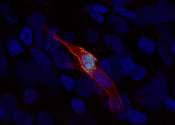The American Journal of Respiratory and Critical Care Medicine is a biweekly peer-reviewed medical journal published in two yearly volumes by the American Thoracic Society. It covers the pathophysiology and treatment of diseases that affect the respiratory system. The journal also publishes review articles in several forms. The "State-of-the-Art review" is a treatise usually covering a broad field that brings bench research to the bedside. Shorter reviews are published as "Clinical Commentaries" or "Pulmonary Perspectives". These are generally focused on a more limited area and advance a concerted opinion about care for a specific process. Case reports are also published.
Recently the journal has included debates of a topical nature on issues of importance in pulmonary and critical care medicine and to the membership of the American Thoracic Society. Other recent changes have included incorporating works from the field of critical care medicine and the extension of the editorial governing body of journal policy to colleagues outside of the United States.
The first issue of the American Journal of Respiratory and Critical Care Medicine was published in March 1917 as the American
- Publisher
- American Thoracic Society
- Country
- United States
- History
- 1917–present
- Website
- http://ajrccm.atsjournals.org/
- Impact factor
-
10.191
(2010)
Some content from Wikipedia,
licensed under CC BY-SA









